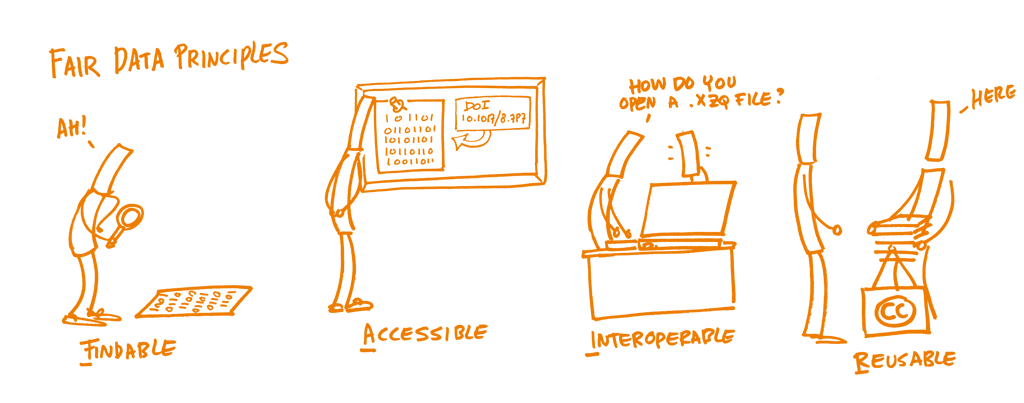
Please contact us at forskersupport@kb.dk. You can also get in touch via eScience Services at Roskilde University's service portal (requires RUC login).
Literature
Additional resources
If you are interested in additional training resources and literature about the FAIR data principles, contact forskersupport@kb.dk.
The FAIR principles aim to improve the Findability, Accessibility, Interoperability and Reusability of research data. The four letters in FAIR refer to 15 principles altogether and apply to both data and metadata (information about data).
One intention with FAIR is to make research more transparent by offering a set of guidelines and best practices which can be adapted across research fields. FAIR illustrates how researchers can ensure that their research data is ‘as open as possible, as closed as necessary’.
FAIR data is not the same as ‘open data’. According to the FOSTER Open Science portal, the term "open data" refers to data which "can be freely accessed, used, modified and shared by anyone for any purpose - subject only, at most, to requirements to provide attribution and/or share-alike". The FAIR principles imply that research data should be as open as possible and as long as you comply with legal, ethical, contractual and commercial obligations. In the context of legal obligations, this includes complying with the General Data Protection Regulation (GDPR).
Thus, unlike "open data", FAIR data can be open to varying degrees. While some researchers can make their research data fully accessible to everyone, other researchers may only be able to share metadata about their data. Even if the latter cannot make their data open to the public, they are still complying with the FAIR principles because they have made sure that others can locate and read about the data.
Researchers should always consider how to adapt the FAIR principles to their specific research data and context and always without compromising any legal and ethical aspects in their work.
 Image: https://book.fosteropenscience.eu/
Image: https://book.fosteropenscience.eu/
Findable – your research data or metadata about the data can be found by others
Accessible – authorised users can access your (meta)data
Interoperable – your (meta)data can be integrated with other data
Reusable – your data can be reused by others where appropriate
These four aspects represent the overall principles of FAIR. To read more, click on Findable, Accessible, Interoperable and Reusable at the top of this page.
Watch this video about the FAIR principles developed by the Danish universities as part of the e-learning course "Research data management". To access the course, please click on this doi: 10.11581/dtu:00000047
Use the checklist above (pdf) as a reference sheet to find out the FAIRness of your research data and what measures can be taken to improve it.